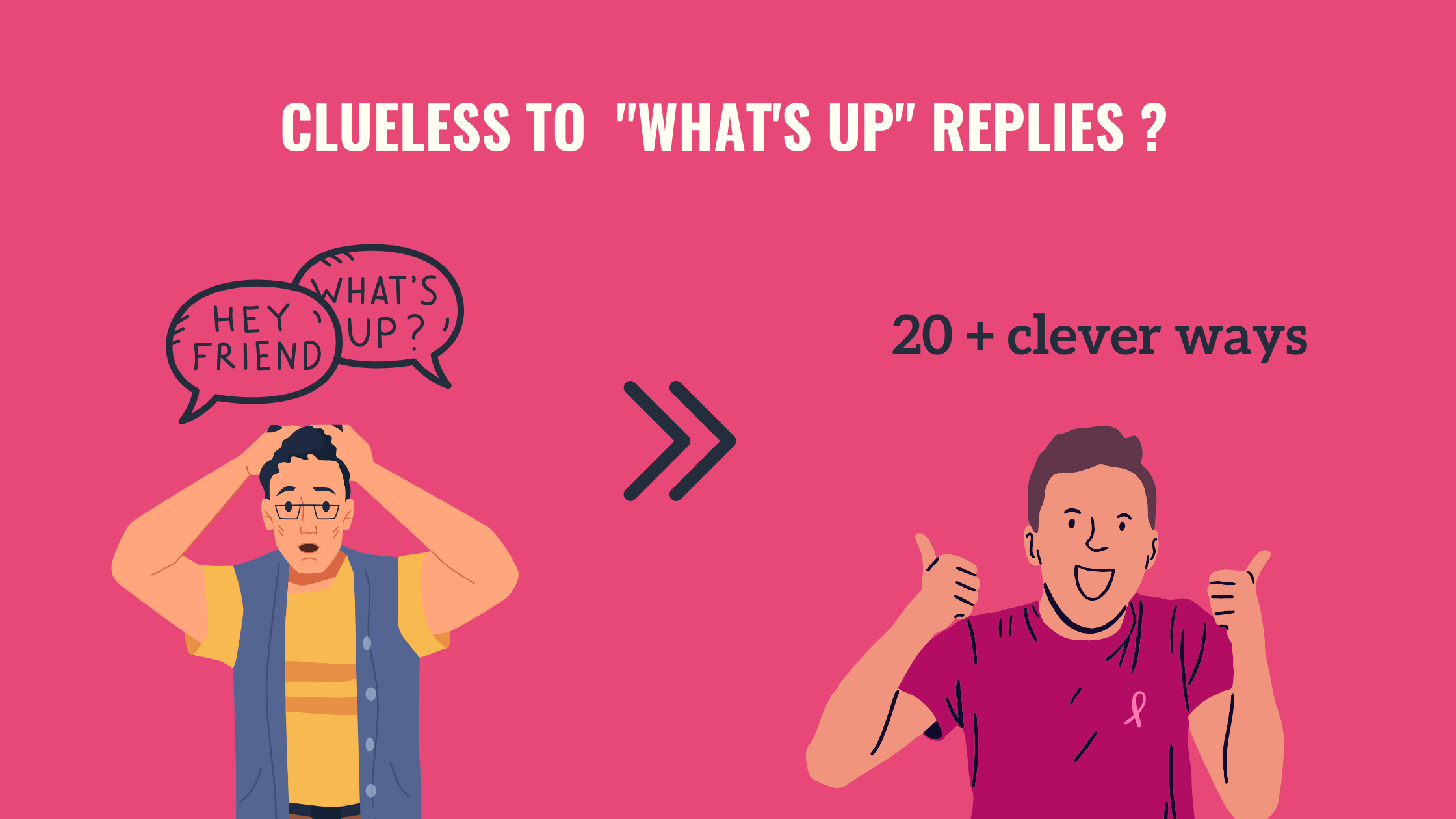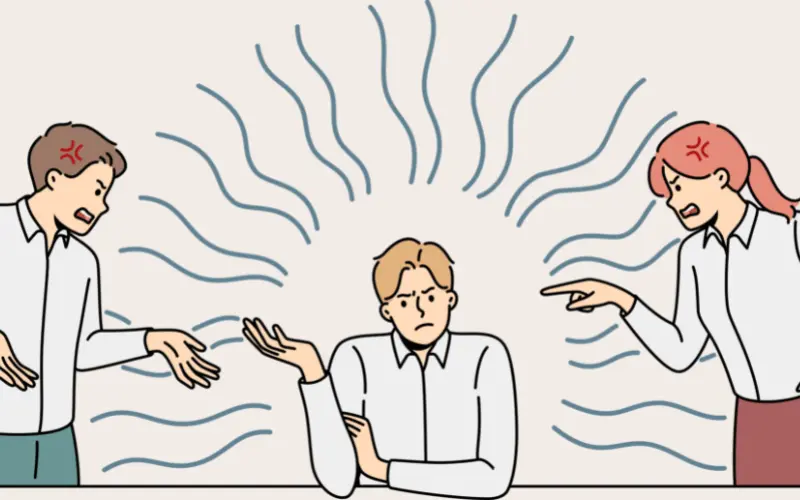Every day, we have at least a dozen casual conversations. While we get into the office, we pick up our daughters from school, ride the elevator with a colleague, or have a dialogue with a relative on a phone call. “What’s up” is usually the best opener for most of these casual conversations. However, these conversations might get evaporated as soon as they get started if you don’t know how to respond to the opener question in the best way possible, i.e., the way that triggers the conversation ahead.
The reason is that people often have difficulty talking in social settings. The shy souls might fail to wisely reply to — “what’s up” — as most introvert fellows feel reluctant to engage in a conversation. Or, most of them are unaware of how to take a conversation ahead when someone comes up with an opening question, “what’s up.” Or most of you might be unaware of the best response to —”what’s up” —.
As a case in point, if you’re unsure how to respond to — what’s up— well, let’s look at some tutorials. Here, we have brought you some clever ways to trigger the conversation ahead when someone comes up with an opening question, i.e., “what’s up.”
“Nothing much. What’s up with you?”
Most likely, the person asking, “What’s up” doesn’t want to hear about everything that’s going on in your life. The person probably just substituted the phrase for “hello.” Therefore, it is best to respond quickly. If you don’t feel like explaining your situation or you’re occupied, use this phrase — “Nothing much.” What’s up with you?” This is an excellent response to use when you have Nothing additional or special thing to say to your friend. Furthermore, you can ask a friend how their lives are going.
“Nothing special.”
The purpose of beginning a conversation with what’s up” is to inquire about the other person’s day. If Nothing has changed since the last time you saw your friend or if Nothing special has happened since then, “nothing special” is the perfect thing to say. In addition, it is useful for checking in on a friend whose problem hasn’t changed, but you want an update. It can be used casually or in more formal settings. If you aren’t in the mood to talk but won’t appear rude or ignorant, you can use this phrase in response to “what’s up?”
“Not a thing but a chicken wing!”
It is likely that some of you are already familiar with this phrase. Due to its rhyme, it has grown in popularity over the years. Elites used to use this response earlier in response to “what’s up” if they weren’t sure what to say. It is evident from the above response that the user is in a good, carefree mood and is interested in continuing the conversation. If you think it will confuse your friend or make him/her laugh, share it with a friend for a few minutes of fun.
“A little busy. Will update you later!”
In case you are busy or occupied with something important, delaying a conversation is not a problem. You’ll hear from me later! Giving a polite or honest answer is much better than giving an abrupt or impromptu answer. Feel free to talk whenever you have time so that you can freshen up with a lighthearted conversation later. You can use this to avoid being rude if you don’t want to talk. You’re at work to do your job, which makes sense for how you should respond. As a result, you will convey a good impression, regardless of whether you engage in a conversation.
“Don’t ask.”
Not all days in your life go equally well. There seems to be Nothing you can do about everything that seems out of proportion. This might be the time when you do not feel like being around someone or sharing your heart, even with your loved ones. In any such scenario, when your times are not running well, someone comes up with the question, “what’s up,” your mind might get blown out as you don’t want to answer it. However, you have to answer it. Such an occasion may call for a short and simple response, i.e., “don’t ask.” Whenever you use the phrase ‘don’t ask, make sure you share it with someone who knows you personally. It is helpful to talk to a friend or family member if you are feeling down.
“Life’s good. Is everything well with you?”
The world has its good and bad times. When referring to the latter, say, “life’s good,” in response to “what’s up.” Additionally, you can add “is everything well with you” to your reply. The listener will be satisfied that you have accurately described your situation. The other part of the phrase will show your compassion and that you are also curious to know about the wellness of your acquaintance.
“Living the dream, you?”
When you are doing well in your life, you may find yourself in the lap of luxury. In your state of well-being, when you see someone striking a question, “what’s up,” before you, the best reply can be, “living the dream, you?” People with an optimistic attitude are advised to reply to the question positively by saying that they are living their dreams. This response stands out as an aesthetically appealing response to anyone whoever you talk to.
“I’m hanging in here…been a tough day.”
Sometimes the course of your life might be going tough, and you find yourself stuck somewhere in the middle of odds and evens. Even then, you need to keep your words light and lively when responding to someone when someone asks you, “what’s up?” Come up with something that reveals the hard time you are trapped in by saying, “I’m hanging in here…been a tough day.” Isn’t it a decent response to a usual question that your concerned ones in your surroundings might ask you?
“Everything that’s supposed to be.”
This is a simple, straightforward response. You can use the phrase “everything that’s supposed to be” in response to their question, “what’s up.” This reply is a good way to avoid long discussions with colleagues, workplace mates, or coworkers. It implies that you are not really in the mood for a discussion, but you are okay. Alternatively, it could be interpreted as a joke, implying that all is well up there, such as the stars, the ceiling, etc.
“Oh, you know…shrug.”
The best response to a friend could be “Oh, you know…shrug” when you don’t feel like explaining when asked, ‘What’s up?’ This does not appear rude while showing that you are not interested in an in-depth discussion. It’s also another way to say, ‘nothing much’ if you are tired, under the weather, or just want to end the conversation quickly.
“That’s for me to know and for you to find out.”
Another catchy phrase that is worth using while replying to “what’s up” is “that’s for me to know and for you to find out.” Though this phrase carries a casual tone, using it for everyone might seem unsound. However, you can use it to reply to those close to your heart, i.e., those who don’t find your humour-filled replies offensive in any way. Your close friends, family members, job mates and whoever claims to be in your close familiarity are the right ones to act in response to “what’s up.”
“Ah, can’t complain.”
Another decent reply to ‘what’s up?’ is ‘Ah, can’t complain.’ This shows you’re not too happy; however, you don’t complain to much either. It means that while things could be better, you are able to manage them well despite things getting worst. To the listener, this may sound a little dry, but it can engage them as well.
“Same old, same old.”
It’s okay not being able to keep the jolly nature alive all the time during the tough course of your life. And if someone in the meantime comes up with a question, “what’s up,” your mind may get clueless on what to reply. If you find your mind deserted somewhere in a state of distress, you can sum up your answer by replying, “same old, same old.” While the answer may not look as gladdening as one may think, it could be the best way to show your dullness without actually looking dull.
“Counting the hours until the weekend.”
When you, who is a party person, are stricken up with a question like “what’s up,” can come along with a reply with a unique phrase which reads as “Counting the hours until the weekend.” Being a party person, you might eagerly wait for the weekend to celebrate the time after an exhausting week. You can convey this phrase to anyone as your reply, no matter who, but it better suits your friends and family members.
“We’re going to find out soon enough.”
It is perfectly acceptable to use this answer when you’re waiting for someone to get help, such as in a lobby or a parking lot, to get assistance. When you say, “we’re going to find out soon enough,” you show that you are still clueless about what the future course of your life is going to be. This reply is equally funny and sensitive and can be used in response to the question “what’s up.”
“Definitely not your fly.”
Specifically, the term “fly” refers to the zipper on the pants or jeans of a person. It is precisely recommended to use it only for your close ones, e.g., friends, family, or anyone in your acquaintance. In order to get a guy off your back, say this to him when he’s trying to hit on you, as it may embarrass him. Also, you can use this in a funny way; tell him/her that you “made you look” when they look at their zipper.
“My blood pressure!”
Using this is recommended if you are getting older. In the event that you suffer from such things as high blood pressure daily, you can use this. Your medical issue is humorously brought to light this way. You will likely start a conversation with your friend when you say something like this.
“Don’t ask!”
Having a bad day? Does everything seems to be out of proportion and going out of your hands? A friend or a family member can help you improve it by sharing your feelings. When using “don’t ask,” make sure you use it with someone you know well enough to comprehend that you’re not being offensive when answering “what’s up.”
“The ceiling, the stars.”
When you tell someone about the ceiling, they may think you’re inside instead of outside. The sky might be a good example, but you might want to specify where you are instead. If it is a starry night, you may want to mention that fact to someone when they ask, “What up,” you can say, “the stars.” These replies are off the wall and can be used to make others aware of your current status, whether you are indoors or outdoors.
“Nothin’ but the rent.”
When your rent actually went up, this could be a funny response. A long-time friend who understands that this is a joke can be fun to use this phrase with. It can be the best way to strike up a conversation. When you want to look witty with your response and start an effortless conversation, you should reply with “my rent” when someone triggers a question like “what’s up.”
“My anxiety levels.”
Anxiety is the body’s normal reaction to stress, described as a feeling of fear or apprehension as to what is coming next. If you want to express how stressed you are but want to keep the mood light, you can reply with “my anxiety levels” when asked, “what’s up.”
“The price of gas/oil.”
If your travel mate who accompanies you most during your trips asks you the question “what’s up,” you can come up with this funny response. This should make the other person laugh. Considering gasoline, i.e., gas or oil prices are high at the moment; this might make an excellent response to “what’s up.”
“My bills.”
Occasionally people ask if you have any plans when they ask, “what’s up?” However, when you are out of business or down to the last penny, you can respond with “my bills” as your reply to the question. This comes off as a funny response when your friend inquires about your well-being.
“It sure isn’t my salary.”
“It sure isn’t my salary” is a funny response you can use while conversing with your friends. It’s hilarious if you work at a low-paying or minimum wage job. You could use this response if you weren’t promoted and feel like making your conversation light with your friends.
“My serotonin levels after seeing you, my friend.”
A flirtatious answer that can also be used when conversing with friends is, “My serotonin levels have increased since I saw you.” Happy people release serotonin in their brains when they are happy, so this answer will make the listener laugh and appreciate your wit. It is one of the smoothest answers when talking to a crush or person of interest.
That’s all!
The above 25 phrases will surely empower your willingness to come up with the best responses you can use to give an edge to your conversation when someone asks you, “what’s up.”











